Paternity leave: How much time off work do new dads get across Europe?
 BBC
BBCBecoming a new dad can be significantly impacted by the amount of paternity leave available to fathers, and a report published this week suggests UK dads fare poorly compared to what's on offer elsewhere in Europe.
BBC News spoke to dads in different countries about how much time they can take off work after the birth of their children - and how that's changed fatherhood for them.
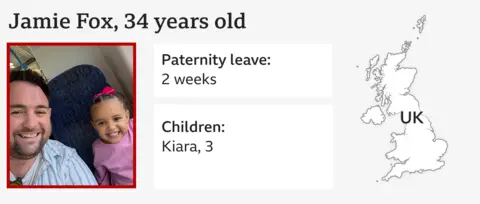
When Jamie's daughter Kiara was born three years ago, he says it was "incredibly difficult".
"I had to watch my partner struggle looking after our child," Jamie says. "The biggest thing I remember was the crying. My daughter clearly needed support and my wife was noticeably struggling and exhausted."
A few weeks after Kiara was born, Jamie's mother-in-law flew from Zimbabwe to support the family, because Jamie was only entitled to statutory paternity leave.
Rules in the UK allow new fathers and second parents in full-time employment to take up to two weeks off work. That applies to all partners, regardless of gender, after the birth, surrogacy or adoption of a baby, but not those who are self-employed or dads earning less than £123 a week.
Those eligible receive £187.18 a week, or 90% of their average earnings, whichever is lower. This works out as less than half of the National Living Wage.
Jamie, from Ashford in Kent, says the statutory pay "was frankly pennies".
He and his partner are now expecting their second child, in August - something they began saving for before Jamie's wife Zanele even fell pregnant.
Jamie says his "frustration" about paternity pay led him to attend the world's first "dad strike" earlier this week, when fathers from across the country protested outside the government's Department for Business and Trade in Westminster.
"Seeing things change relatively recently in other countries... why are we not keeping up?" Jamie says.
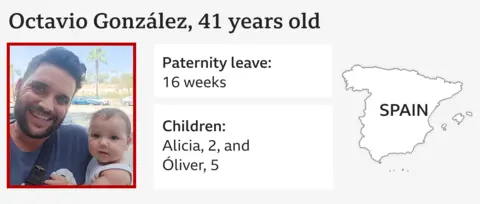
For Octavio, spending four months at home with his daughter Alicia has made "a tremendous difference".
He split his paternity leave into two parts - six weeks - which was mandatory -immediately after Alicia was born, and the remaining 10 weeks when his wife went back to work.
"The extended quality time with Alicia allowed us to develop a strong bond that I believe wouldn't have formed as deeply otherwise," says Octavio, a computer engineer from Seville.
Over the past few years, Spain has increased the amount of time given to new fathers. In 2019, dads were entitled to five weeks off work. But from 2021, that was extended to 16 weeks at full pay, including for those who are self-employed. There is no cap on the salary paid. It means parental leave is now equal between mums and dads in Spain.
"These changes have truly made a significant difference," says Octavio.
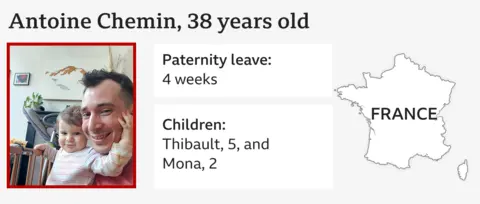
France has also made progressive steps on paternity leave in recent years.
Antoine is an architect who lives on the outskirts of Paris, and has benefitted from the changes. When his son Thibault was born five years ago, Antoine, who works full-time, was entitled to two weeks paternity leave.
But in September 2020 paternity leave in France doubled, meaning Antoine got four weeks off work when his second child was born in 2023.
"It allowed me to support my wife and children," he says. "Fathers should be allowed to be more present during these family life periods that enrich all relationships and allow them to fully take their place as full-time parents."
France's paternity leave rules mean dads - including those who are self-employed - must take a week off work immediately after their child is born. Pay is covered by the employer for the first three days, but after that is state-funded.
The remaining 21 days, which can be split into two chunks, are optional and can be taken anytime within the next six months. Pay is capped at €3,428 (£2,921) a month.
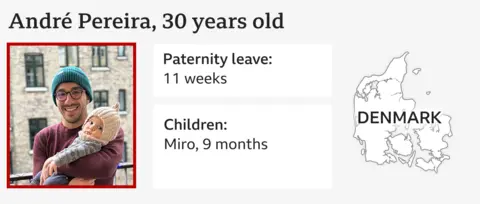
André, who was born in Portugal and spent nine years living in England, says the prominent role played by dads in Denmark was one of the first things he noticed when he moved there.
"You see dads strolling around with their kids and young babies," André says. "I was like: 'Wow, I'm not used to this.'"
Dads in Denmark, including those who are self-employed, can take up to 24 weeks off work at full pay by the state.
After eleven weeks, the remaining 13 can be transferred to the birth partner if wanted, so they can use them as extra maternity leave. One of the parents can postpone up to 13 weeks of parental until their child is aged nine.
André decided to split his parental leave - taking two weeks immediately after his baby Miro was born and saving the remaining 11 weeks - so he can look after his nine-month-old son when his partner returns to work.
"In Denmark, it's expected that the partner is more present," André says. "You're not only connecting with your child, but you want to develop the family as a whole together."
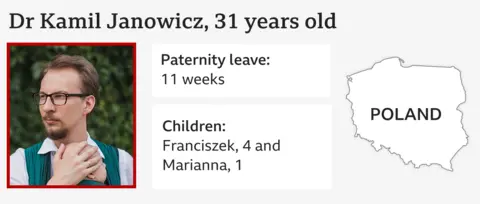 Dr Kamil Janowicz
Dr Kamil JanowiczDads with full-time jobs in Poland are entitled to two weeks of paternity leave. But unlike in the UK, the salary is paid at 100%, which Kamil says was "great".
Shortly after his daughter Marianna's first birthday, Kamil took another nine weeks of non-transferable parental leave, which must be taken in the first year. This is available to both parents, as long as they are employed, and is paid at 70% of a full-time salary.
"For many families, the 70% nine weeks is very low," Kamil says, "but... when I took the leave my wife started going back to work. I earned 30% less, but she started earning more, so it was beneficial for our family."
Kamil says those extra nine weeks alleviated a lot of "stress" as his wife transitioned back into work after a year off on maternity leave.
"I was confident," Kamil says. "I felt as though I was doing a good job - and my daughter felt good with me."
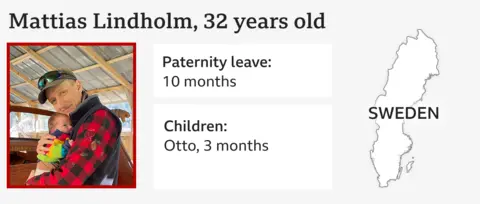
Mattias, from Stockholm, says comforting his three-month-old son is "the best feeling I've ever experienced".
Mattias is able to take advantage of one of the most generous paternity leave policies in the world. Parents in Sweden, including those who are self-employed, can share up to 480 days of parent leave, with 90 days reserved specifically for each parent.
Ringfencing time off for dads was first introduced in Sweden in 1995, with the introduction of a "daddy month" - 30 days just for fathers. This use-it-or-lose-it model increased to 60 days in 2002, and 90 days in 2016.
The first 390 days for each parent are paid at 80% by the government, up to a monthly salary cap of SEK47,750 (£3,590). After that, there's a daily statutory compensation of SEK180 (£14).
Mattias took six weeks off when Otto was born and will use another nine months of parental leave from November.
"We could share the load in the beginning when everything was new," Mattias says. "Those six weeks allowed us to be parents together - that made a huge difference. "
Paternity leave - the view from the UK
Some companies, both in the UK and abroad, pay out of their own pocket for enhanced paternity leave policies beyond the statutory minimum. But research from 2023 showed just 12% of fathers from low-income households had access to their full entitlement of employer-enhanced parental leave and pay.
Alex Lloyd-Hunter, co-founder of The Dad Shift, says "money is the single biggest barrier" to dads taking time off work and wants the government to fund better paternity leave for all dads.
A report, published this week by the Women and Equalities Committee (WEC) said statutory pay in the UK was "completely out of kilter with the cost of living". It suggested the government should consider increasing paternity pay to 90% or more and paternity leave to six weeks in a phased approach.
The report also looked at shared parental leave, introduced in 2014, which allows parents to share up to 50 weeks of leave and up to 37 weeks of pay after the birth or adoption of a child. The review found many families considered it "unnecessarily complex". It is used in fewer than 2% of all births and a report from 2023 suggests almost half (45%) of dads were not even aware shared parental leave was an option.
"We know the parental leave system needs to be improved," a spokesperson for the Department for Business and Trade said, adding the government would review maternity leave, paternity leave and shared parental leave.
They also pointed to changes which mean dads will soon no longer have to be employed by a company for 26 weeks to be entitled to statutory paternity leave.
